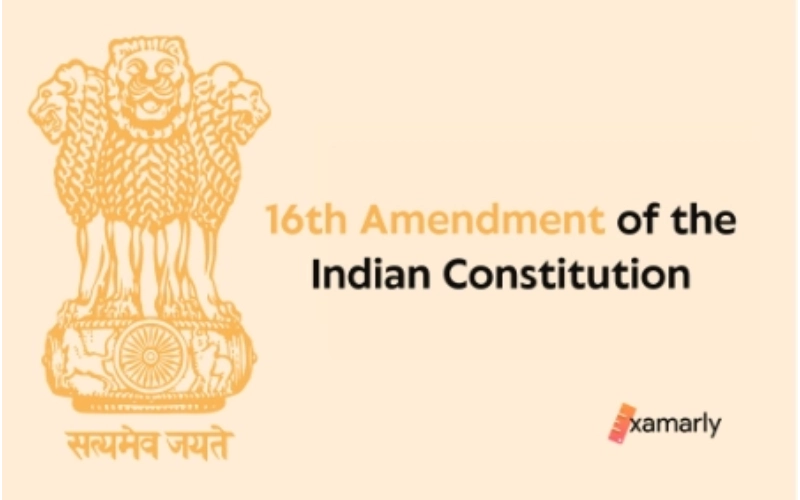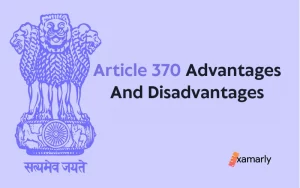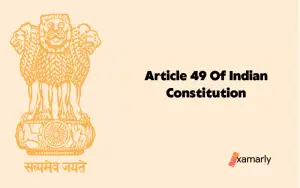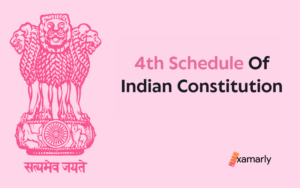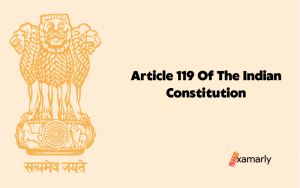The 16th Amendment Act of 1963 asserts that additional restrictions are to be placed on the rights to assembly, free speech, and organization formation. India’s sovereignty and integrity were protected by doing this.
The 16th Amendment of the Indian Constitution included the notions of sovereignty and integrity in the oaths and declarations that legislators, ministers, judges, and the CAG of India are expected to make.
This article will assist you in your UPSC exam by providing information about a very important topic of the Indian Polity syllabus.
What is the 16th Amendment of the Indian Constitution?
Constitution (Sixteenth Amendment) Act of 1963 was the official name for the 16th Amendment of the Indian Constitution. On 5 October 1963, the 16th amendment came into effect. This amendment was enacted by the Parliament in the Fourteenth year of the Republic of India.
The Indian constitution’s Article 19 has undergone a change to many of its provisions, thanks to the 16th amendment.
The primary objective of the 16th amendment to the constitution of India was to preserve the nation’s integrity and sovereignty. In order to stop any action that would jeopardize the integrity of the country, it put a few extra restrictions on Indian citizens’ fundamental right to speech and expression.
It emphasizes that any form of a social group must be established legally and democratically in order to safeguard India’s sovereignty and integrity at any and all costs. It also requires the same of public officials, who must uphold it when swearing an oath to the government before accepting responsibilities.
It is important to remember that India’s three constitutional positions come in the form of oath or affirmation “exclusively” in respective articles of oath in the Indian Constitution: The President, The Vice-President, and The Governor.
Objects and Reasons
The Committee on National Integration and Regionalism of the National Integration Council recommended amending Article 19 of the Constitution. Article 19 of the Constitution should be amended in order to make adequate powers available for the safeguarding and upkeep of the integrity and sovereignty of the Union.
The Committee further thought that each candidate for a seat in a State Legislature or Parliament, as well as each candidate for and holder of public office, should swear to respect the Constitution and to safeguard the integrity and sovereignty of the Union.
Additionally, it is recommended that the oath forms in the Third Schedule of the Constitution be appropriately modified for this purpose.
In order to give effect to these suggestions, clauses (2), (3), and (4) of article 19 are being altered. This will allow the State to enact laws that, in the interests of India’s sovereignty and integrity, impose reasonable limitations on the exercise of the rights granted by subclauses (a), (b), and (c) of that article’s clause (1).
Additionally, it is proposed to amend articles 84 and 173 as well as the forms of oath in the Third Schedule of the Constitution to require that all candidates for membership in the Parliament or State Legislature, as well as Union and State Ministers, Members of Parliament and State Legislatures, Judges of the Supreme Court and High Courts, and the Comptroller and Auditor-General of India, take an oath to uphold the sovereignty and integrity of India.
Major Provisions
- Section 2 amends Clauses (2), (3), and (4) of Article 19. This was done to enable the state to make laws that, in the interests of the sovereignty and integrity of India, place reasonable restrictions on the enjoyment of the rights conferred by sub-clauses (a), (b), and (c) of clause 1 of the article.
- Article 84 and Article 173 were amended, to provide that every candidate for the membership of Parliament or state legislatures, Union and state ministers, Judges of the supreme court and high courts, and the comptroller and Auditor- General of India should swear an oath to uphold the sovereignty and integrity of India. The forms of oath in the third schedule are amended.
Conclusion
The 16th Amendment of the Indian Constitution included two provisions. First, the amendment of the article was done to give the state more ability to restrict people’s freedom of expression. It forbids anyone from expressing anything that would endanger India’s integrity.
Second, to establish associations in support of India’s sovereignty and integrity.


